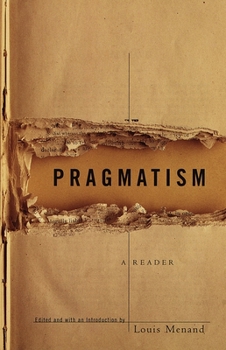Pragmatism: A Reader
Select Format
Select Condition 
Book Overview
An invaluable resource--and an absorbing read--for everyone who is interested in the roots of American culture. Here are the major texts of American pragmatism, from William James, John Dewey, Oliver Wendell Holmes, and Charles Sanders Peirce to Cornell West, Richard Rorty, Hilary Putnam, Richard Posner, and Richard Poirier, now collected and reprinted unabridged. All are remarkable for the wit and vigor of their prose and the mind-clearing force of their ideas. They reflect the vital role that pragmatism has played in almost every area of American intellectual and cultural life, inspiring judges, educators, politicians, poets, and social prophets.
Format:Paperback
Language:English
ISBN:0679775447
ISBN13:9780679775447
Release Date:October 1997
Publisher:Knopf Doubleday Publishing Group
Length:560 Pages
Weight:1.00 lbs.
Dimensions:0.9" x 5.2" x 8.0"
Related Subjects
Contemporary Fiction Literature & Fiction Philosophy Politics & Social Sciences PragmatismCustomer Reviews
4 ratings
Good overview of pragmatism
Published by Thriftbooks.com User , 16 years ago
A very well written and illustrative introduction about history of pragmatism and its significance today. The articles and authors are well chosen and interesting
Excellent!
Published by Thriftbooks.com User , 16 years ago
Could be considered the "sequel" to the other "Pragmatism" (by William James.) James sort of sketched the landscape and this book fills in the detail, with color. If you haven't read James's book, read it first, then this one. Both eminently readable, but only for those who are into such things.
You have to be into the subject matter!
Published by Thriftbooks.com User , 20 years ago
This book is an excellent and vert comprehensive overview of Pragmatism. This is only one thing that needs to be pointed out that wasn't directly stated in the other reviews. You have to be extremely interested in the subject matter and have a background in philosophy to firmly grasp the complex issues. Some chapters are more accessible to the layman than others, while the slight majority of them are difficult reads for anyone. I enjoyed the book and I absolutely loved some of the writings, especially William James's works, but it was not an easy read. Lastly, the book was a little too dry. I have read other pragmatist works that were humorous and insightful while also being easily accessible to virtually all readers. This volume had none of these and that is a shame. Other than that the book was excellent and highly informative.
Eye-openingly Good!
Published by Thriftbooks.com User , 23 years ago
This book is astounding! It manages to accomplish in around 500 pages the twin tasks of giving a functional outline of the rise and rise of pragmatic thought and also to give examples, old and new, of that same pragmatic thought. The three more well-known "founders" (popularisers) of this philosophical method slash attitude are here in C.S. Peirce, William James and John Dewey along with an interesting selection of more modern pragmatists, such as Richard Rorty (of course!), Cornel West and Hilary Putnam. One name that is missing from the contemporary selection is Stanley Fish, but since he seems to aim his sights indiscriminately he may be thought to be rather roguish for this sane and coherent selection of writings that the editor, Louis Menand, has pulled together. In his introductory piece Menand charts Pragmatism's birth in the universities of north eastern America in the second half of the nineteenth century and points up some of its distinctives (of which there are very few and deliberately so). This piece is worth the price of the book itself for its clarity, insight and authority. The choices Menand makes in presenting the pragmatic thinkers will always be one of judgment and decision (Are the two writings he chooses from Richard Rorty's work, "Philosophy as a Kind of Writing" and "Postmodernist Bourgeois Liberalism" really more appropriate to this collection? I would choose others.) and we may quibble with one or two and suggest others but Menand has made his choices and given his rationale and we, as readers, can ask no more. What is served up is insightful and powerful (when taken together) as an example of pragmatic thoughts in practice and, as such, demonstrates the oft written thought of William James that Pragmatism "does not stand for any special results. It is a method only." James means that pragmatists don't have to agree to be pragmatic for being pragmatic is "trac[ing] out in the imagination the conceivable practical consequences.....of the affirmation or denial" (C.S. Peirce) of whatever belief, truth or proposal you have in mind. Thus, we realise that Pragmatism as a philosophy is at least contextual, subjective and case by case. As a reader in Pragmatism this book does a superb job of demonstrating this and Menand, as editor, is to be congratulated. Much recommended.PoSTmodERnFoOL





